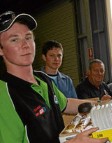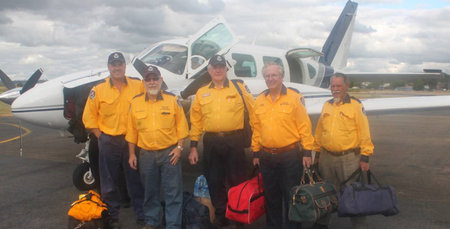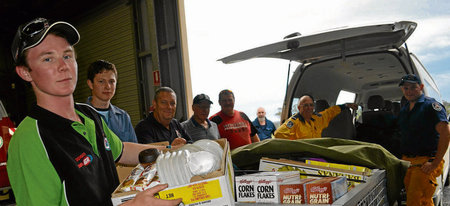October Bush Fire Emergency
Published Date: 25 Oct 2013

Summary
South West Slopes Zone crews assisted with the Blue Mountains fire fighting efforts.
Aviation Brigade called to fires
Cootamundra Herald
GIVEN the bushfire conditions affecting the state this week, Cootamundra Aviation Brigade's John Ashcroft said he knew it was a matter of when, not if, they got the call-up to assist their colleagues in the danger areas.
The Aviation Brigade, a branch of the South West Slopes Zone Rural Fire Service, assists to refuel aircraft used in fighting fires from the air with retardant.

Ready to board their flight bound for Albion Park are RFS Cootamundra Aviation Brigade members (from left) Andrew Alderman, John Ashcroft, Brian Morgan, David Pascoe and John Barry.
The men, including David Pascoe, Brian Morgan, John Barry, Andrew Alderman and John, received the call to lend a hand on Wednesday and that evening boarded a small plane out of Cootamundra Airport bound for Albion Park.
They were without too many details as to their briefing, however John said they would be loading bombers as of yesterday morning for five days.
Aviation crews, while not on the frontline, are specifically trained to carry out the important tasks of refuelling planes. Their slick operation gives pilots the quickest possible turnaround time and minimal time on the ground at the airport putting them back over the fire as soon as possible where they are needed most.
Firies help out in Lithgow
The Young
Up to 43 firefighters from the South West Slopes Zone have gone to help their RFS counterparts fight the devastating fires.
And more than half of them (27) come from the Young Shire.
Last Thursday the Rural Fire Service SWS Zone sent five tankers to Lithgow with a crew of 18 firefighters from Young, Boorowa, Cootamundra and Harden.

South West Slopes Zone Rural Fire Service members Tom Reeves from Boara brigade, Matthew Warren (Cloverhill), Mick Weir (Wambanumba), Cobber Cooke (Monteagle), Pat Vincent (Young), Don Ray (Cootamundra), Michael Burns (Harden) and John Taylor (Harden).
The tankers currently remain at Lithgow with the RFS rotating their crews on three-day deployments.
The latest crew - which included 11 Young firefighters, most on their second deployment – was dispatched from the Young RFS Station in Rockdale Road for another three-day run on Tuesday night.
"On all accounts our crews are doing an exceptional job with property protection and back burning operations," RFS SWS Zone district manager Andrew Dillon said.
"Three staff including myself have been deployed to incident management teams at Bulga and the Mittagong fire," he said.
"It is likely that our staff will be rotated over the next two weeks to assist further with coordination in and around Sydney."
Young volunteer firefighter Patrick Vincent is currently on his second deployment in Lithgow. He will be returning home tomorrow.
He's been involved with a couple of back burns in the area but has been mostly doing property protection.
"The conditions are windy, cold, hot … it's tiring during the day and long hours," he said.
"While we were setting up for property protection in Bells Line Of Road we could see spot fires everywhere."
Spot fires are caused from flying sparks or embers igniting at a distance from the main fire.
Despite the big job, Patrick said his fellow firefighters have been in "excellent" spirit.
Local firefighters are battling blazes for eight to 10 hours a day with two to three breaks, during which they refill their tankers with water.
Nationals Member for Burrinjuck Katrina Hodgkinson has paid tribute to the outstanding contribution RFS volunteers from across the Burrinjuck electorate have made to the fires.
"Since the state of emergency was declared last Thursday, brigades and strike forces from across the Burrinjuck electorate have been deployed widely across the state," Ms Hodgkinson said.
"Many of these volunteers have now returned to the electorate, and thankfully I have been reassured today that none of them has sustained any injuries to date, despite the dangerous nature of their work."
Ms Hodgkinson said the Burrinjuck electorate started the year with a catastrophic fire danger warning and devastating bushfires swept through several areas of the electorate, particularly near Yass and Boorowa.
"During those fires, brave and dedicated RFS volunteers were deployed into this area to help local crews battle the flames," she said.
"Our firies are now gratefully returning the favour and they deserve our stoutest support for their willingness to leave behind their work, family and friends to help save life and property right across NSW.
"Their dedication to protecting the people of NSW is magnificent and inspiring and I congratulate them on the fantastic job they are doing."
Help in times of crisis
Cootumundra Herald
IN the event of a bushfire every person in the community wants to do something to help. With the Rural Fire Service (RFS) seeking volunteers now is the perfect time to put your hand up to be in a position to assist.
South West Slopes RFS district manager Inspector Andrew Dillon said currently about 1700 volunteers exist across the zone which takes in the local government areas of Cootamundra, Harden, Young and Boorowa.
"There is a job for everyone," Insp Dillon said.
As well as frontline positions, Insp Dillon said there are support functions people can fill including radio communications and catering.
"Every brigade needs someone who can drive people during shift changeovers," Insp Dillon said, adding "Every brigade needs someone to help with catering".
"It is not just about hopping on a truck."
Anyone over 18 years can be a member of the RFS, there is no physical fitness requirement, only a background check.
Some brigades will even accept members between 16 years and 18 years of age.
Being an RFS volunteer provides invaluable support to the district.
"I believe volunteers get a certain level of satisfaction out of doing something to help in the town they live in," Insp Dillon said.
"It is really about the fact as an RFS volunteer you can have an immediate impact when there is a local emergency," he added.
It is not just the local district where people can help with local RFS volunteers increasingly putting their hands up to participate in out of area deployments.
The skills gained from RFS training, including first aid and chainsaw certificates as well as firefighting proficiency, are all nationally recognised and can be beneficial for paid employment outside of the RFS.
Each local area has their own brigade under the South West Slopes RFS banner including everything from Wallendbeen and Stockinbingal to Bethungra, Frampton and Dudauman.
There is also a Cootamundra Headquarters brigade captained by Dave Holder and an Aviation Support Brigade captained by John Ashcroft.
The Aviation Support Brigade has been in existence over recent fire seasons and volunteers assist with refilling planes with retardant during bushfires.
They have become a valuable addition to the local zone and the Aviation Brigade is a good opportunity to put your hand up to help without having to go near the frontline of a blaze.
Insp Dillon encouraged anyone interested to contact their local brigade captain about becoming an RFS volunteer or call the South West Slopes RFS headquarters in Harden on 6386 3170 for more information.
"We are an organisation with great values which has been around for a long time," Insp Dillon said.
~ Hazard reduction operation ~
MEANWHILE local RFS volunteers got to put their skills to good use last Friday conducting a successful hazard reduction operation near Tanyinna Gates on the Olympic Highway heading towards Bethungra.
Insp Andrew Dillon of the South West Zone RFS said a number of brigades were involved in the operation.
He said the railway line is the main north/south running firebreak to protect Cootamundra.
"It is a really strategic firebreak," Insp Dillon said.
"If a fire heads in to Coota from the west, the area is where firefighters can get on top of it," he added.
He said now is the ideal time for back-burning operations with the grass dry.
"Fuel on the line has been drastically reduced," Insp Dillon said.
Local firies answer the call
Cootamundra Herald
AS the bushfire crisis continues across the state, volunteer firefighters from the South West Slopes Zone Rural Fire Service, including Cootamundra, have been on the frontline.
Inspector Andrew Dillon, district manager of the South West RFS, said a strike team of members from across the local area were deployed late last week when the emergency escalated.
Up to five tankers, of differing sizes, and 20 firefighters were part of the initial strike team.
Insp Dillon said last Thursday this strike team left the local area bound for the 'State Mine' fire which commenced in Lithgow and headed down the Bell's Line.
Crews are being rotated to give firefighters a break, however Insp Dillon said some are backing up for double stints.
With the situation dire on Thursday the strike team jumped straight into property protection east of Lithgow.
As firefighters gained the upper hand crews were tasked to different activities including backburning.
For those crews there this week they are likely to face testing conditions today and the focus is likely to be on property protection once again.
"Ensuring life, of firefighters and residents, is always the first and foremost priority, followed by protection of property," Mr Dillon said.
He said it is a very different type of fire that firefighters are facing particularly around the Blue Mountains compared to what they are used to in this local area.
With rugged bush terrain, access is a constant issue and the fires can go on for days and weeks at a time.
"Here, with grass fires, the run of the fire can stop on the evening of the fire," Insp Dillon said.
"It is a more time consuming process in the mountains," he added.
Local RFS staff have also attended the fires with Insp Dillon stationed at Bargo in response to the Southern Highlands fire earlier this week and other staff also responding to the various blaze.
Cootamundra Headquarters RFS volunteer Gil Kelly was amongst those who were part of the initial strike team.
Driving the Cootamundra tanker Mr Kelly collected other volunteers from the South West zone and travelled to Lithgow, leaving at 5am Friday morning.
They did not return home until just after midnight Sunday night.
Mr Kelly described the experience as "full-on" saying fighting fires in the dense bush landscape is a completely different experience to fighting grass fires in this local area.
Thrown straight into property protection, he praised the community spirit of the towns which have come under threat saying everyone is pulling together and helping out.
brigades.
Witness



